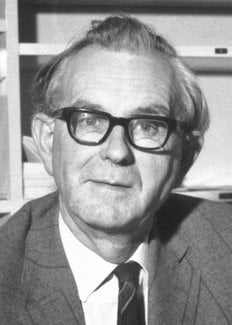Rodney R. Porter
Biographical

Rodney Robert Porter born 8 October 1917 at Newton-le-Willows, Lancashire, England.
He was educated at the Ashton-in-Makerfield Grammar School taking his Hons.B.Sc. (Biochemistry) in 1939 at the University of Liverpool and his Ph.D. at the University of Cambridge in 1948.
After one year’s postdoctoral work at Cambridge, Professor Porter joined the scientific staff of the National Institute of Medical Research in 1949 and was there until 1960 when he joined St. Mary’s Hospital Medical School, London University as the first Pfizer Professor of Immunology.
In 1967, he was appointed Whitley Professor of Biochemistry in the University of Oxford and Fellow of Trinity College, Oxford.
Amongst his awards are those of:
Fellow of the Royal Society, 1964
Gairdner Foundation Award of Merit, 1966
Ciba Medal (Biochemical Society), 1967
Karl Landsteiner Memorial Award from the American Association of Blood Banks, 1968
National Academy of Sciences, U.S.A., Foreign Member 1972
He took his Ph.D. at Cambridge under the supervision of Dr. F. Sanger investigating protein chemistry. In 1948 Professor Porter started to investigate the structure of antibodies, but on moving to Mill Hill he worked on methods of protein fractionation collaborating with Dr. A. J. P. Martin. The particular interest was in chromatographic methods of fractionation.
He returned to the study of the chemical structure of antibodies leading to the finding of the three fragments produced by splitting with papain in 1958-59. He continued this work at St. Mary’s Hospital Medical School and put forward the peptide chain structure of antibodies in 1962.
Since moving to Oxford he has been concerned with the structure of antibody combining site, of the genetic markers of immunoglobulins and recently in the chemical structure of some of the early complement components.
During the war years 1940-46 Professor Porter was in the army serving with the R.A., R.E., and R.A.S.C., finishing with the rank of Major. He was with the First Army in 1942 in the invasion of Algeria and with the 8th Army during the invasion of Silicy and then Italy. He remained with the Central Mediterranean Forces in Italy, Austria, Greece and Crete until January 1946.
This autobiography/biography was written at the time of the award and later published in the book series Les Prix Nobel/ Nobel Lectures/The Nobel Prizes. The information is sometimes updated with an addendum submitted by the Laureate.
Rodney R. Porter died on September 6, 1985.
Nobel Prizes and laureates
Six prizes were awarded for achievements that have conferred the greatest benefit to humankind. The 14 laureates' work and discoveries range from quantum tunnelling to promoting democratic rights.
See them all presented here.
